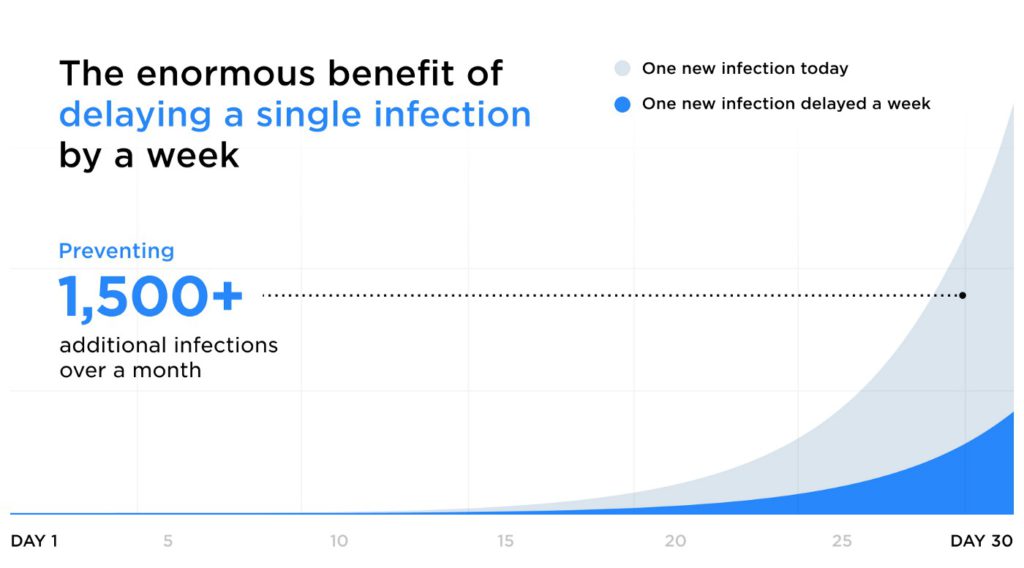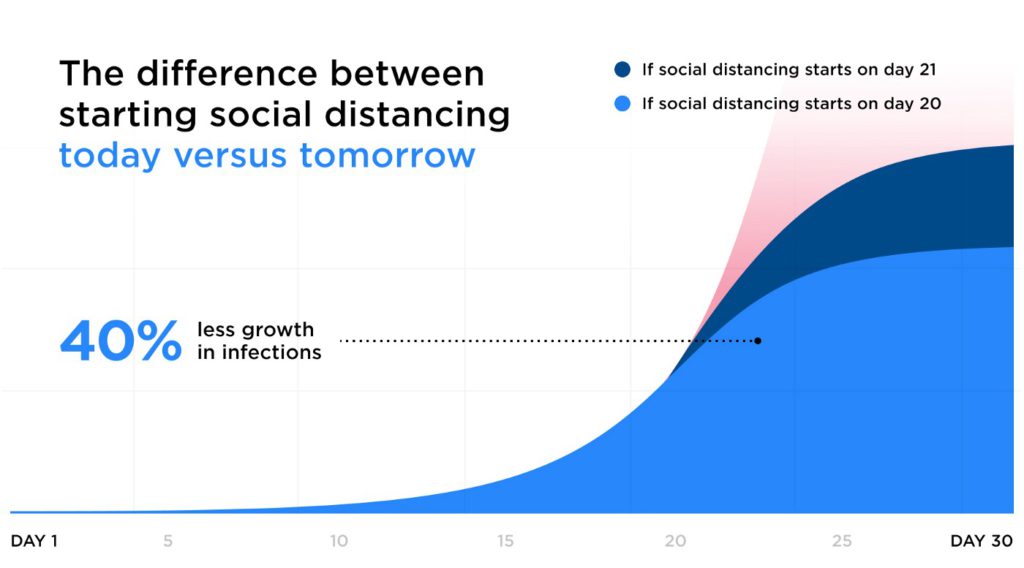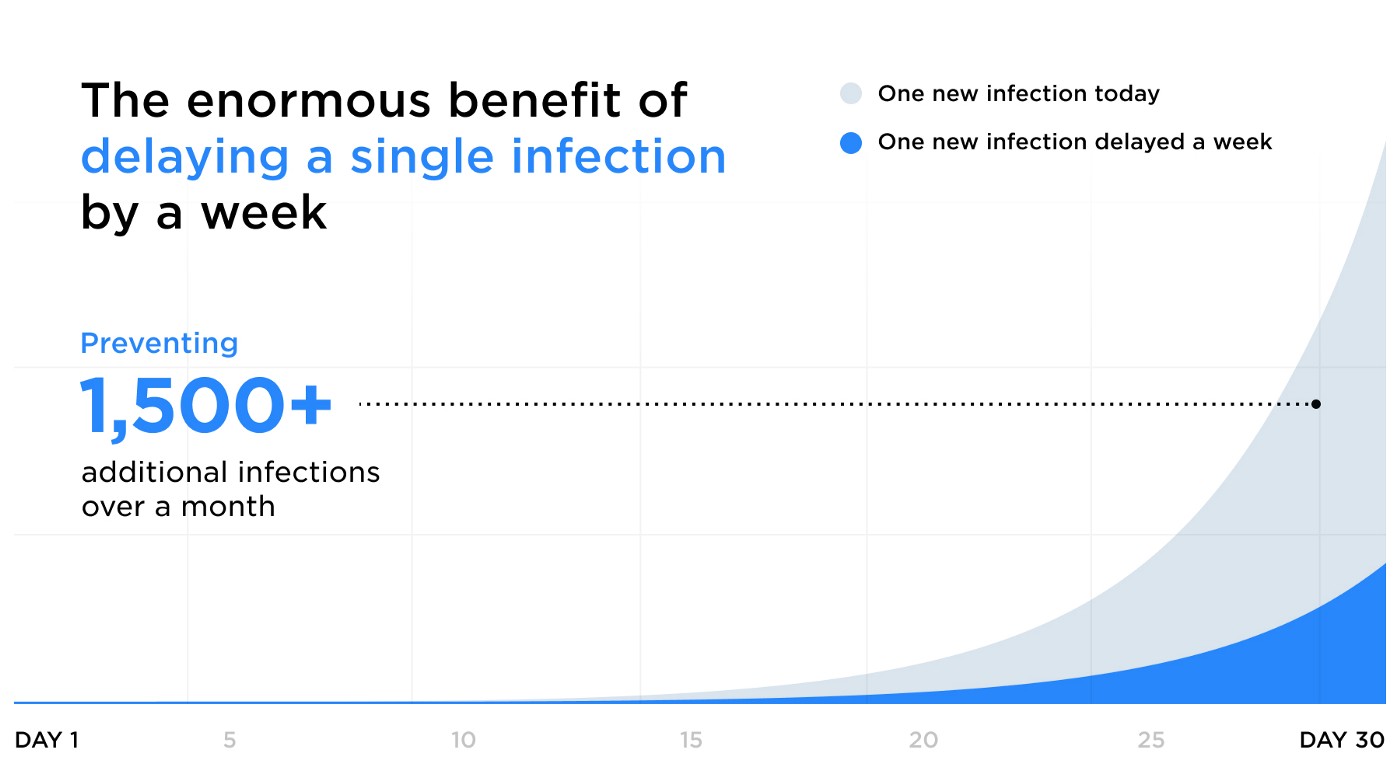As this viral pandemic evolves rapidly, we’re actively monitoring developments to help protect your health. Over the last week, it’s become increasingly clear that communities must take independent measures to slow the spread of this virus. Fortunately, we’ve seen that start to happen. Sporting events are cancelled, schools are closed, businesses are supporting employees in working from home. As individuals, there is also a lot we can do to help the most vulnerable among us.
No doubt you’ve seen the charts and heard the phrase “flatten the curve”. The expression isn’t about reducing the cases — it’s about easing the impact on healthcare infrastructure while scientists work to develop vaccines and cures. A flat curve means that the number of people getting sick occurs at a low enough rate that healthcare systems can sustain support. A steep curve overwhelms the system and extends the problem well beyond those falling ill to COVID-19. A steep curve drains resources and impacts anyone ill enough to need a hospital visit. A flat curve means fewer lives lost.

You’ve also hopefully heard the term “social distancing”. You may have read this Medium post (28 million people have) depicting a harrowing account of what our health system will be if we don’t take action or this article from the New York Times highlighting the difference that one day of action can make. You may have even watched this simulation from the Washington Post showing the impact social distancing can have on slowing the transmission of this virus. We strongly agree with the scientists and researchers who have authored these works, and we believe social distancing is crucial to ensuring our healthcare systems have the time they need to care for the most vulnerable among us.

You may be thinking this doesn’t apply to you, especially if you’re young and healthy. While it is true that the mortality rates for individuals under the age of 40 and those without pre-existing conditions are much lower than the mortality rates for older populations or those with compromised immune systems, all of our actions directly affect those most at risk. The decision we face is whether to be part of the problem — helping the disease spread quickly — or be part of the solution, uniting as a society to limit the spread and protect the vulnerable among us.
What can you do? While it may feel dramatic, especially if you aren’t at high risk, there are small sacrifices we can all make to help slow the spread — flatten the curve — and give healthcare providers time to care for those in our communities who need it most.
Redefine Your Routine
We recommend limiting activities outside the home to those that are essential and maintaining distance from other individuals. Reschedule non-essential appointments and travel, limit eating out and avoid group activities like workout classes. Get take-out or use a delivery service (cooked food is preferable) if needed, and choose transportation methods carefully. Whenever possible, drive a personal vehicle and avoid public transportation.
When out,
- Maintain six feet of distance between yourself and other people.
- Wash your hands with soap and water for at least 20 seconds, or use hand sanitizer if soap and water are not available, especially after touching surfaces like door handles and payment machines.
- Choose contactless options, like mobile ordering and Apple Pay, whenever possible.
- Avoid touching your face, especially your eyes, nose and mouth.
When you get home,
- Disinfect your frequently touched objects, like your phone, wallet, keys and water bottle.
Practice Hygiene at Home
While staying home is your best bet both for minimizing your risk of getting coronavirus and for limiting the spread to others, it is also important to be thoughtful about your interactions with family and friends in your house.
- When any person enters your house, they should immediately wash their hands.
- Ensure there is soap by every sink and use clean towels to dry hands.
- If you’re using cloth towels, designate a towel per person and wash frequently.
- Throw away tissues and paper towels immediately after each use.
- Disinfect frequently touched surfaces like handles on doors, sinks, fridges, dishwashers and cabinets, light switches and remotes.
- Be cautious while preparing food and avoid sharing utensils and cups.
Socialize Safely
During times of crisis, it is important to take care of your emotional health as well. Stress from routine changes, fear of yourself or loved ones getting sick, and limited social interaction can be a lot to handle. Remember that we’re all in this together, and explore ways to care for your mental wellbeing.
- Set up reminders to text, call or video chat with friends and family each day.
- Find activities you can do together remotely — watch the same TV show or movie, form a virtual book club or cook and eat dinner together.
- If you’re craving real-life connection, take your exercise outdoors together, playing tennis or walking on a quiet trail.
- Hold each other accountable, checking in to make sure your loved ones are dedicating time to care for themselves. Encourage one another to stretch, meditate, read or whatever you love to do.
We know this won’t be easy, and we have your back. Forward’s COVID-19 Care Program provides you with the latest guidance and information about COVID through the app. You can also access your Care Team 24/7, assess your symptoms, and schedule a COVID vaccine or test. Open to all members, this program helps you stay on top of information that can help keep you safe through the end of the pandemic.
Our actions today will impact the scale of this epidemic tomorrow. Every day matters.


